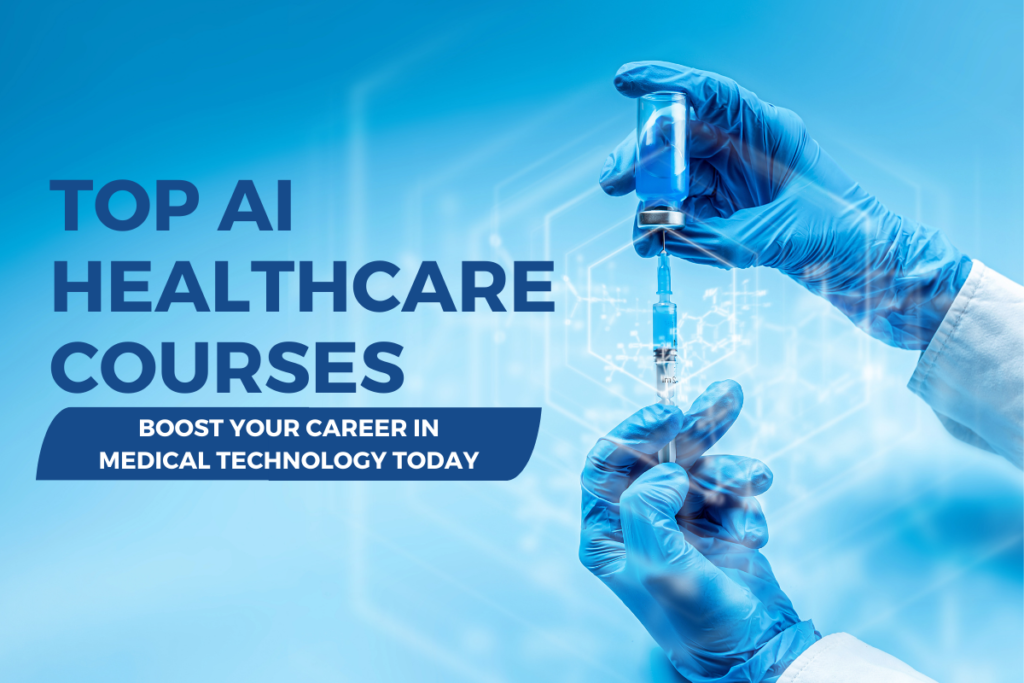An AI healthcare course for nurses empowers doctors, nurses, and tech experts to leverage AI for diagnostics, patient care, and research. Read more about 2025’s leading certifications and programs that are shaping the future of medicine. These comprehensive courses equip students with the essential practical skills and innovative methodologies that are critical to advancing efficient healthcare delivery and digital research capabilities.
Best AI in Healthcare Courses For Doctors and Other Medical Professionals
This category is directed at practicing clinicians looking to incorporate AI technology into clinical practice. An AI in healthcare course for doctors improves your diagnostic skills as well as introduces you to cutting-edge treatment planning. They merge theoretical and practical applications, allowing doctors to confidently integrate AI tools into everyday practice and thereby optimizing patient outcomes.
- Harvard Medical School: Artificial Intelligence in Clinical Practice (12 weeks, $1,600).
- Stanford Online: Machine Learning for Medicine Specialization.
- Coursera: AI for Medicine (from Deep Learning AI, taught by Andrew Ng).
Such courses range from AI-enhanced diagnostics to drug discovery to robotic surgery, giving participants a strong footing in the rapidly advancing intersection of AI with clinical care. Enrolling in the Best Artificial Intelligence in healthcare courses allows medical practitioners to learn about advanced data analytics as well as practical applications in patient management and therapeutics.
Doctors and medical professionals not only learn the advanced concepts of CLIP but also get their hands dirty with using state-of-the-art tools through signing up for these Ai healthcare course. By combining theoretical knowledge with hands-on training, the course provides participants with a deep understanding of AI’s impact on contemporary health care and equips them to apply these insights in a clinical context without delay.
These well-respected courses further provide partnerships with top technology thinkers, creating a course experience that couples the theory with real-world delivery in the clinic. Such hands-on education develops technical expertise but also cultivates innovative, creative thinkers who are prepared to drive transformative change in how healthcare is delivered.
Online AI healthcare course: Flexible learning for busy lives
Encouragement of learning and skills designed for active professionals. These courses are delivered on a self-paced basis, allowing clinicians to marry their clinical commitments with the broadening of technology education. Easy to develop and deploy, online learning offers affordability and accessibility, making it convenient to increase skills at a pace to remain relevant and competitive in the rapidly changing digital health environment.
- EdX: MIT’s AI in Healthcare (free, $300 for a certificate).
- Udacity: AI for Healthcare Nanodegree (4 months, $1,356).
AI in Health Care Management: AI Healthcare Course Online
Impressively, 72% of 2024 graduates said career progression after certification. These online programs employ interactive modules, video lectures, and discourse assignments to produce actionable expertise that keeps learners competitive with the advancing digitalization of healthcare.
An online AI healthcare course is built for busy schedules, enabling practitioners to immerse themselves in executive learning while fitting around their daily responsibilities. Such flexibility promotes regular upskilling and has a significant role to play in building the muscle of lifelong learning, a critical element in the volatile domain of healthcare.
An online AI healthcare course offers hands-on practice through virtual classrooms and interactive simulations while granting immediate, real-time feedback. Such a digital approach enables the uptake of advanced education for all who wish to continue their education, no matter where in the world they are located. Learn across various professional careers at their own pace by working on real, live projects, which reflect modern-day evolving healthcare technologies.
Certificates in AI Healthcare Course
Very few certificate programs exist that would enable professionals to validate their expertise in applying AI to healthcare settings. These certifications focus on practical training as well as theoretical studies, providing you with qualifications that can increase your employability. They are ingrown to cater to the increasing number of most innovative, tech-driven specialists in the emerging health tech Arena.
- Coursera: AI healthcare course – (Johns Hopkins) real white box Python projects.
- UC San Diego: AI Predictive Medicine (genomics specific).
- Google Cloud: Healthcare natural language API & ML workshops.
An Artificial Intelligence in healthcare certificate can bolster resumes for jobs at health tech companies such as Epic or Teladoc. Rooted in project-based learning and real-world case studies, these programs prepare participants with skills to support pioneering positions that leverage AI to improve patient care and streamline processes within healthcare.
Not only do these certificate programs validate technical competence, they also send a signal of commitment to innovation in healthcare. These projects also provide a platform to collaborate with specialists in the field, learning skills that will enable learners to be agents of change in the realm of patient care, while also ensuring that they acquire expertise that is relevant in the face of rapid advancements in technology.
These programs lead to extraordinary career opportunities.
Conclusion
AI healthcare course unifies medicine and technology, providing the necessary tools to transform results for patients. Do you want to pursue a Stanford specialization, a Google Cloud certification, or an NHS-backed program? Healthcare’s future is growing increasingly algorithmic — don’t be caught behind. Learn skills that are reshaping gamification and future-proof your career today

